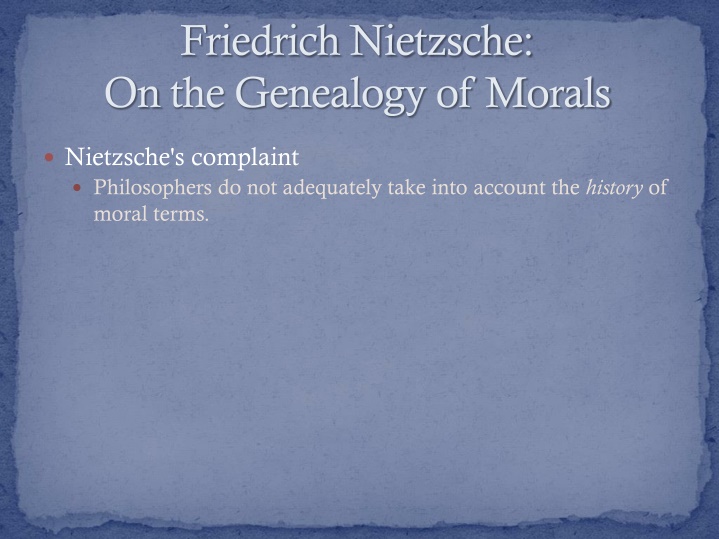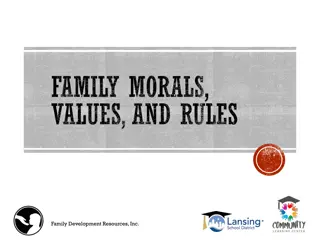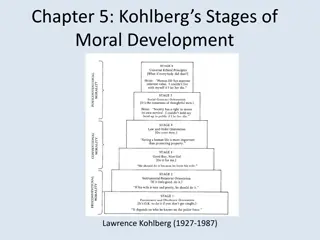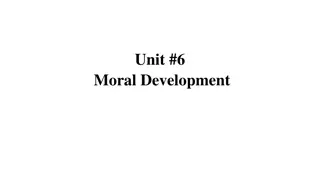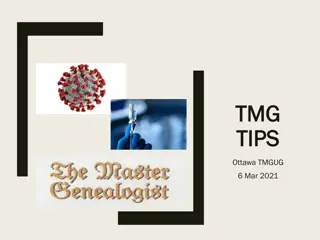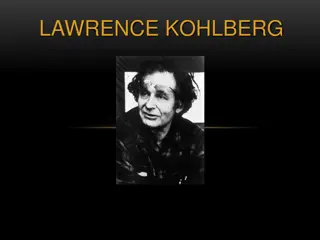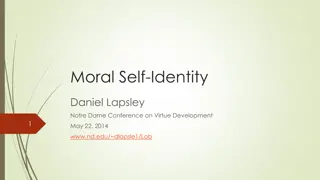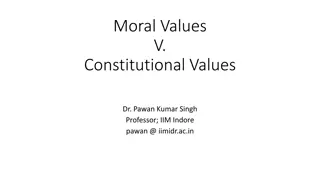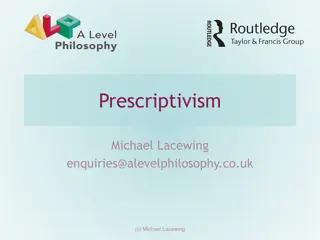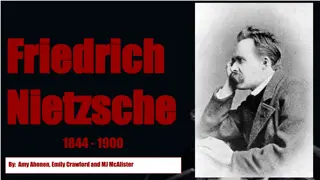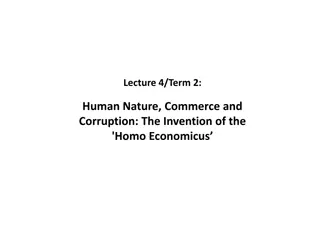Friedrich Nietzsche's Genealogy of Morals: Uncovering the Evolution of Moral Values
Friedrich Nietzsche critiques traditional philosophy for overlooking the historical development of moral concepts. He argues that moral judgments were initially based on strength and power, later evolving into the dichotomy of master and slave morality. By tracing the genealogy of moral terms, Nietzsche seeks to challenge conventional moral values and reveal how they have shifted over time.
Download Presentation

Please find below an Image/Link to download the presentation.
The content on the website is provided AS IS for your information and personal use only. It may not be sold, licensed, or shared on other websites without obtaining consent from the author.If you encounter any issues during the download, it is possible that the publisher has removed the file from their server.
You are allowed to download the files provided on this website for personal or commercial use, subject to the condition that they are used lawfully. All files are the property of their respective owners.
The content on the website is provided AS IS for your information and personal use only. It may not be sold, licensed, or shared on other websites without obtaining consent from the author.
E N D
Presentation Transcript
Friedrich Nietzsche: On the Genealogy of Morals Nietzsche's complaint Philosophers do not adequately take into account the history of moral terms.
Friedrich Nietzsche: On the Genealogy of Morals Nietzsche's complaint Philosophers do not adequately take into account the history of moral terms. Because of this, they assume that unegoistic actions were always regarded as good.
Friedrich Nietzsche: On the Genealogy of Morals Nietzsche's complaint Philosophers do not adequately take into account the history of moral terms. Because of this, they assume that unegoistic actions were always regarded as good. Nietzsche's genealogical method By tracing the history of our ethical concepts and showing how they have changed over time, Nietzsche hopes to undermine the conventional moral values they support.
Friedrich Nietzsche: On the Genealogy of Morals The origin of good and bad The good themselves that is, the noble, the powerful, the superior, and the high-minded were the ones who felt themselves and their actions to be good . . . and posited them as such. They did not regard unegoistic actions as good, but approved of actions that enhanced their power. It was only the resentiment of the weak that brought about a transvaluation of these values.
Friedrich Nietzsche: On the Genealogy of Morals Master and slave morality Master morality: Originally created by the strong and powerful, who regarded themselves as good, and the weak and powerless as bad.
Friedrich Nietzsche: On the Genealogy of Morals Master and slave morality Master morality: Originally created by the strong and powerful, who regarded themselves as good, and the weak and powerless as bad. Slave morality: Created by the weak and powerless out of resentment for the strong and powerful, who they labeled evil.
Friedrich Nietzsche: On the Genealogy of Morals Master and slave morality Master morality: Originally created by the strong and powerful, who regarded themselves as good, and the weak and powerless as bad. Slave morality: Created by the weak and powerless out of resentment for the strong and powerful, who they labeled evil. Thus, while the master morality begins positively with a concept of the strong and noble and labels it good, the slave morality begins negatively with a concept of that which is hated and labels it evil.
Friedrich Nietzsche: On the Genealogy of Morals Guilt and bad conscience Our idea of conscience is the product of a long history of transformations. It did not arise from the practice of punishment. Bad conscience originally arose from our transition to civilized society, which required the increased use of conscious reflection, and the inhibition of our instincts, which we then turned on ourselves. Guilt reaches its peak with the sense of indebtedness to the Christian God for sacrificing himself.
Friedrich Nietzsche: On the Genealogy of Morals Asceticism Asceticism is born of ressentiment, when an unsatisfied instinct leads one to try to repress it. The ascetic ideal is derived from the protective and healing instinct of a degenerating life. Ultimately, asceticism represents a will to nothingness, an aversion to life, a rebellion against the most fundamental preconditions of life, but which is and remains none the less a will . . . man would rather will nothingness than not will at all.
Friedrich Nietzsche: On the Genealogy of Morals Asceticism Asceticism is born of ressentiment, when an unsatisfied instinct leads one to try to repress it. The ascetic ideal is derived from the protective and healing instinct of a degenerating life. Ultimately, asceticism represents a will to nothingness, an aversion to life, a rebellion against the most fundamental preconditions of life, but which is and remains none the less a will . . . man would rather will nothingness than not will at all. Becoming the author of Value
